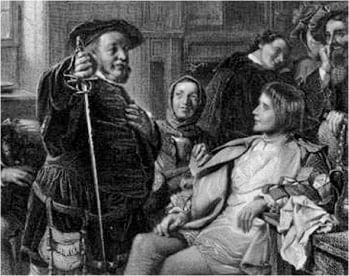The insulting in Shakespeare

'Thou knotty-pated fool...'
WILLIAM Shakespeare's plays are full of scenes in which people insult one another. He created many wonderful characters who display sharp wit through their strikingly expressed insulting remarks and pungent phrases for obvious inclusion here. This helps them seem lively on the stage and is great fun for the actors who get to voice all the insults. In life, who would not feel great if he can slip one of the memorable lines into a conversation? How nice it is to begin with Hamlet's famous remark on the weakness of women, "Frailty, thy name is woman". Menenius hurls stinging insults to the conspirators against Coriolanus, "More of your conversation would infect my brain", meaning talking to you is driving me mad.
A close reading of the plays will give us lots of verbal weapons to use on our friends and enemies alike. If we do not want to see our friend so often we may say, "I do desire we may be better strangers". We mean to say our friend is so cold-hearted that even his wee is icy " But it is certain that when he makes water, his urine is congealed ice!"
In Henry VI, Clifford pours practical insult on Richard of York thus, "Heap of wrath, foul indigested lump/As crooked in thy manners as thy shape!" Kent furiously insulted villainous Oswald in King Lear, "Thou whoreson zed, thou unnecessary letter!" Lysander in the spell of a potion in A Midsummer Night's Dream shouts at his lover Hermia, "Hang off, thou cat, thou burr!"
Shakespeare's language is so subtle that we can use it while insulting somebody without being overtly harsh: "When he is best, he is little worse than a man, and when he is worst he is little better than a beast." To insult bluntly on the face, we can say, "There is not so ugly a fiend of hell/As thou shalt be." Marullus, in order to agitate the mob in Julius Caesar, tells the commoners of Rome that they have no more feeling than a stone, "You blocks, you stones, you worse than senseless things."
Shakespeare's fools are otherwise wiser than the sages. But when a Shakespearean character intends to insult another, he calls him a fool, "Away, you three inch fool!" or "Either thou art ignorant by age / Or thou wert born a fool." The insult becomes more biting now: "Tis fools such as you /That makes the world full of ill-favoured children".
Shakespeare can infuse a series of insulting epithets into his character's mouth. In Love's Labour's Lost, Berowne accuses Boyet of giving the game away by divulging a secret: "Some carry-tale, some please-man, some slight zany/Some mumble-news, some trencher-knight, some Dick…./Told our intents before". In Romeo and Juliet, Mercutio harps on the main theme of family feud when he insults Benvolio, "Thy head is as full of quarrels as an egg is full of meat".
Drawing on a few from among an enormous range of insults, one is hard put to place them in an order. In the Taming of the Shrew, the love-hate relationship between Petruchio and Katherina is the source of a traumatic plethora of insults. In one of their heated quarrels, Katherina angrily says, "Asses are made to bear, so are you", to be equally requited by Petruchio, "Women are made to bear, and so are you". In another fiery altercation, Petruchio, just after striking her servant tells Katherina, "A whoreson beetle-headed, flap-eared knave!" Petruchio affronts a tailor: "Thou flea, nit, thou winter-cricket thou!"
Falstaff has been the occasion for a number of insults in different plays by Shakespeare. Prince Hal flays Falstaff, "Thou clay-brained guts, thou knotty-pated fool, thou whoreson obscene greasy tallow-catch."
Falstaff, a notorious but amusing character, affronts Hostess Quickly, "There's no more faith in thee than in a stewed prune", meaning you are no more honest than a fruit, in Henry IV. The insulted in another occasion calls him, "Thou honeysuckle villain".
There is no end to the sea of insults in Shakespeare. One can hardly stop from quoting them one after another. Lafew impatiently shouts to Parolles in All's Well That Ends Well, "You are not worth another word, else I'd call you knave".
Even in critical circumstances, Shakespeare is able to make stinging insults blend with humour. An instance is a dialogue between Macbeth and a murderer who introduces himself thus, "We are men, my liege", only to get insulted by the former, "Ay, in the catalogue ye go for men". On another tense occasion, Macbeth calls a servant, "Thou lily-livered boy".
Shakespeare is famous for his words. The vein of insult is equally apparent in the curses made by his characters. Macbeth, impatient with fateful and frustrating events all around him since he met the witches, curses a servant in the tone of banter for bringing bad news "The devil damn thee black, thou cream-faced loon! Where gott'st thou that goose look?" Sometimes insult is synonymous with curse in Shakespeare. King Lear is unfortunate to have two ungrateful daughters. Being tormented by them just after he hands his kingdom over to his pelican-hearted daughters Goneril and Regan by depriving the innocent Cordelia, Lear prays to the goddess for making his daughter Goneril unfertile: "Into her womb convey sterility/Dry up in her the organs of increase/And from her derogate body never spring/ A babe to honor her."
In short, Shakespeare, in portraying life as it is, created unforgettable characters endowed with all human follies and traits of insult, love, hate, curse. And they enjoy their lives in full. The lines quoted here are just a gateway to get into 900,000 words penned by Shakespeare in order to acquire wisdom as well as pleasure.

 For all latest news, follow The Daily Star's Google News channel.
For all latest news, follow The Daily Star's Google News channel. 



Comments